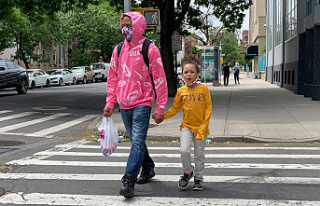In a statement, Biden stated Blinken will use regional partners to make sure"the coordinated global effort to guarantee immediate aid reaches Gaza."
MORE ON THE ISRAEL-PALESTINIAN CONFLICT
-- US reaches out to Palestinian leaders several angrily reject
-- Following a different war, displaced in Gaza face familiar plight
-- EXPLAINER: What was the outcome of this latest Gaza war?
Blinken's talks with Israeli Prime Minister Benjamin Netanyahu, Palestinian President Mahmoud Abbas, Egyptian President Abdel Fattah el-Sissi and Jordanian King Abdullah II will focus on shoring up the cease-fire, sending urgent help to Gaza, end intra-communal violence in Israeli towns and placing the preliminary groundwork for a return to peace talks, according to a senior State Department official.
The official, who was not authorized to talk about the trip by name and spoke to reporters on the condition of anonymity, stated Blinken would be looking at the way the U.S. can support Israel and the Palestinians in rebuildingaddress the underlying causes that led to this crisis and advance equal measures of freedom, security and prosperity for Israelis and Palestinians"in tangible ways."
The official wouldn't offer specifics as to exactly what those"tangible ways" are, however, donor nations are being asked to look at potential new contributions to rebuild damage done to civilian infrastructure in Gaza.
While Blinken will meet with the leaders of Israel, the Palestinian Authority, Egypt and Jordan, he won't see anyone from the militant Hamas movement that runs Gaza. Hamas is a U.S.-designated"foreign terrorist organization," and contacts between American officials and the team are prohibited. That usually means the U.S. must rely on third countries such as Egypt and Qatar to pass messages into Hamas. Hamas and Abbas' Fatah movement are also in danger, meaning that Palestinian leadership is split.
The senior State Department official said one aim of Blinken's discussions would be to attempt to reintegrate Fatah"to some extent" to a leadership role in Gaza, where it has been locked out of energy since dropping elections in 2006. The official stated that may help create conditions for more stability.
The Biden administration was taken to task because of its early result of the violence, for example from Democratic allies in Congress who were demanding it take a tougher line on Israel and its own response to rocket attacks from Palestinian militant groups in Gaza.
The administration has defended its answer by saying it engaged in extreme, but quiet, high-level diplomacy to support a cease-fire, which was finally arranged a week after Egyptian mediation.
Blinken said Sunday that the behind-the-scenes effort led by Biden paid off, procuring a truce after 11 days.
"President Biden directing this campaign made the decision that we could be most effective in doing that. And ultimately, following this intensive effort throughout the government, we must where everyone needed to be, which was to end the violence," he explained in an interview with CNN.
"But today, as the president said, I think that it's incumbent upon us to try to make the turn to start to build something more positive, and what that means at heart is that Palestinians and Israelis alike need to understand inside their own day in and day out lives equivalent measures of opportunity, of security, of dignity," Blinken said.
He explained the time is not right for an immediate resumption in negotiations between both sides but that steps could be obtained -- mainly humanitarian attempts -- to repair damage from Israeli air strikes in Gaza, which caused significant damage to civilian deaths and infrastructure.
"I really don't think we are in a place where getting to some kind of a discussion for what ultimately, I think, has to be the outcome, which can be a two-state solution, is your primary order of business," he said. "We have to start building back in concrete ways and offering some genuine hope, prospects, opportunity in the lifestyles of people."












